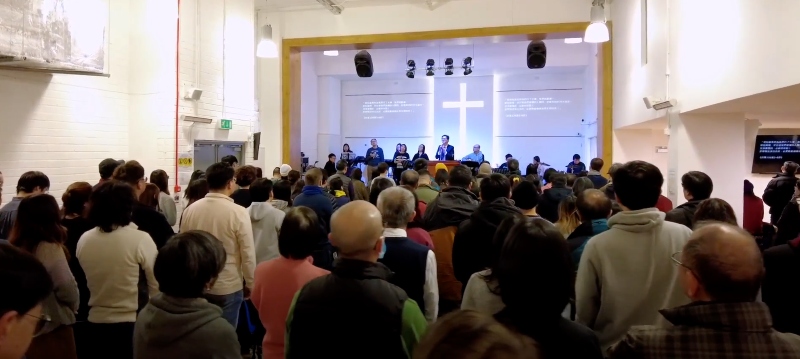The hidden concerns amid epic growth
A recent study found the Chinese Church to be the fastest growing church in the UK, boosted in part by people emigrating from Hong Kong.
Pastor Chi-Wai Wu, the former director of Hong Kong Church Renewal Movement who moved to the UK almost three years ago, offers three observations on the Chinese Christian community in the UK

Having settled in the UK for nearly three years, my retired life has involved frequent interactions with pastors and laymen during their stop-by visit and my service to preach at various gatherings across the country. This article intends to integrate my personal observations on the current situation and prospects of Chinese (Hong Kongers) churches in the UK, with reference to Dr. Yinxuan Huang’s research findings of "Chinese Christianity in Britain".
1. Population mobility contributes to the congregational growth in churches
As shared in the report "Chinese Christianity in Britain", it is expected that between 2021 and 2023, a total of 150,000 to 200,000 British National Overseas (BNO) visa holders will settle in the UK from Hong Kong." (Page 3)
"In the past two years, the number of Chinese Christians in the UK has rapidly increased. The population has grown by more than 25,000, with at least 27 new congregations have been set up. The growth rate is 28.8 per cent, making it the fastest-growing Christian community thus far in the UK." (Page 3)
The rapid numerical growth of Chinese churches in the UK is not driven by the overall quality of the churches but is attributed to the growing BNO Hong Kongers’ community, where Christians are estimated to be at least 20 per cent, or approximately 40,000 people (based on 200,000 people). The report predicts that by 2023, there will be 115,290 Chinese Christians, as compared to 83,072 in 2011, commanding an increase of 32,218 people.
Undoubtedly, population mobility (especially within the Christian community) is primarily the objective factor contributing to the growth of Chinese (including Hong Kong) churches in the UK. In some popular cities among immigrants, such as Manchester and Birmingham, being blended with other favourable factors, numerical growth happens as a natural phenomenon.
In my past service in Hong Kong, I had encountered both the positive and negative sides of population mobility on congregational growth, particularly in areas where a new town was being developed: new areas absorb inflowing population that conduces to numerical growth of the church; on the flip side, when communities dwindle or undergo redevelopment, an outflow of the population takes place, the development of congregations halts and is affected significantly.
Currently, the surge of Hong Kongers migrating to the UK has shaped the thriving growth picture of congregations. However, should there be political changes or increased return of Hong Kongers to their place of origin, a probable decline in congregation size may take place. In the past, Canadian Chinese churches experienced growth due to an influx of Hong Kong immigrants, and a similar decline occurred when there was a wave of return, ultimately shrinking the size of Cantonese-speaking community.
The swift expansion of Chinese churches in the UK is only temporary, a consequence of what is termed as "accidental mission." Recent missiological studies point out that the mission of God often manifests through two ways: "intentional mission" involving the establishment of missional agencies, sending out dedicated missionaries to other cultures, races, and linguistic regions.
On the other hand "accidental mission" is resulted from natural disasters, economic and political changes, religious persecution, etc., which inadvertently cause mass migration and diaspora of Christians. Historically, Chinese churches only emphasised on "intentional mission," yet nowadays with globalisation in a turbulent time, "accidental mission" is emerging as the new norm.
Immigrant waves typically last no more than five to 10 years, and it is foreseeable that the rapid growth of Chinese congregations in the UK will not continue endlessly. In the initial one or two years, many visitors to Chinese churches are shopping around, with Hong Konger Christians hopping among different congregations in the same city. Once settled, Chinese churches will then face the teething problems of new versus old values, setting aside political views. Value disagreements manifest in leadership decisions, ministry styles, qualifications for service, and interpretation of faith.
The struggle between unity and division has always been inevitable in the life cycle of Chinese churches!
2. The Majority Favours Local English-Speaking Churches
The " Chinese Christianity in Britain " study points out: "Approximately three-quarter Chinese Christian worshipers attend Chinese churches. Notably, as compared to other first-generation Chinese immigrants, British-born Chinese, Malaysian-Singaporean Chinese and Hong Kong BNO immigrants arriving after 2021 are more likely to choose non-Chinese churches." (Page 3)
From my observations and interactions, BNO immigrant families arriving after 2021, with children mostly in primary school, predominantly choose to attend non-Chinese churches across different cities across the UK.
Let’s take Bristol as an example. The overall number of Hong Kong Christians who attend local churches (such as Broadmead Baptist Church, Community Church, St Michael’s Church, Emmanuel Bishopston, Fishponds Baptist Church, Christ Church, etc.) surpasses the combined attendance of three local Chinese churches.
A rough estimate suggests that two-thirds of Hong Kong immigrants attend non-Chinese churches, while those who attend Chinese churches accounts for approximately one-third. Of course, there is also a small part of the Hong Kongers group attending both English and Chinese churches on regular basis.
The church landscape in the UK is primarily parish-based, where churchgoers acknowledge and engage with the local community church, whether English or Cantonese-speaking. However, neither of these churches can provide all-round, age-specific and cross-generational gatherings collectively in one place. To achieve a somewhat ideal church life, one needs to connect with two or three different faith communities.
As the report analyses, Hong Kong BNO immigrants differ from those of the previous generation. They have stronger political orientation and robust identity as "Hong Kongers", hence harbouring certain doubts towards traditional Chinese churches. As a result, they choose English-speaking churches as one of the platforms to integrate with the local community.
The community of Hong Kong Christians settling in English-speaking churches is no longer transitional but has evolved into a "hybrid model." Some churches, within a month, offer two Sunday services, one with a Cantonese-speaking sermon and the rest in English. The worship, announcements, and prayers are conducted in English. Some churches host Hong Kong fellowship gatherings once or twice a month, while others organise Bible study classes or enrichment programs for Hong Kongers. Unlike church dynamics of the past, these are not pre nest-leaving arrangements to pave way for the setting up a new Chinese or Hong Kongers’ congregation.
3. The Impact of Leadership Qualities on Church Growth
The "Chinese Christianity in Britain" study identifies three core issues in Chinese ministries: "co-workers," "youth," and "meeting spaces."
The issue related to "co-workers" is highlighted in the report: Chinese churches lack pastoral personnel. With the expansion of missionary fields, Chinese churches urgently require pastors and mature lay leaders. (Page 37)
The author finds the discussion in this part of the report somewhat unclear and confusing, leading to a sense of ambiguity. Through interviews with 45 church leaders, the understanding is that the term "co-workers" refers to individuals "who are willing to cooperate and serve under instruction, whether full-time, part-time, or voluntary." In reality, among the BNO immigrant community, there is a considerable number of pastors moving into UK. The author strongly disagrees with the assertion that Chinese churches in the UK lack pastoral personnel; rather, it is more accurate to say there is an abundance of pastors but a shortage of positions.
The reality is that Chinese churches cannot financially support too many pastors, and the remuneration for pastors in Chinese churches in the UK is far lower than that in Hong Kong. Some full-time pastors earn an average monthly income of only around £2,000, while part-time pastors receive around £1,000. Some pastors even have to take on part-time job to make ends meet.
In the past, the culture of a Chinese church community often revolved around seniority and qualifications, where pastors of strong foothold become prestigious figures of the church. Now, with the influx of Hong Kong pastors, who possess proven academic backgrounds, qualifications and experience, voices become more diversified. One can imagine that the deep-rooted mindset of “exclusivism” among some church leaders, compounded by leaders’ wariness of talent or potential competition, prohibit high-calibre individuals from serving at the Chinese church, not to mention the incumbent lower wages or even working unpaid.
To promote collaboration among pastoral co-workers, leaders of Chinese churches have to be open, receptive and willing to bring out the best of talents. In doing so, co-workers are safeguarded from burnout, intangible trauma, and resignation of ministry jobs.
With regards to “Youth” ministry, the author does not reckon running children and youth gathering at every single Chinese church is essential. This is because collaboration with local English-speaking churches will be more sustainable in long run.
Conclusion
The rapid numerical growth of Chinese churches in the UK is a delightful picture of God's sovereignty. However, it is of utmost importance for church leaders to embrace a long-term vision, a broad mindset, and discernment in recognising and appointing individuals.
Last but not least, their ability to build strong teams is the key to establishing a community with solid faith for God’s glory.
Image | Manchester Alliance Church | Bible Society
 The Revd Chi-Wai Wu was the senior pastor of Yuen Kei Alliance Church (1984- 2000) and the director of Hong Kong Church Renewal Movement (2000-2020)
The Revd Chi-Wai Wu was the senior pastor of Yuen Kei Alliance Church (1984- 2000) and the director of Hong Kong Church Renewal Movement (2000-2020)
He is familiar with the church health and church planting in Hong Kong. He also contributed much to the development of Christianity in Hong Kong. Since moving to the UK three years ago, he has helped local churches offering hospitality to Hong Kong migrants, and remains active in ministry, despite being retired.
This report was translated by Tammy, a second generation Christian who settled in the UK from Hong Kong in early 2021. She now attends a non-Chinese church based in Nottingham.
Do you have a view? Share your thoughts via our letters' page.
Baptist Times, 11/01/2024